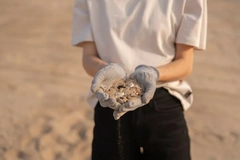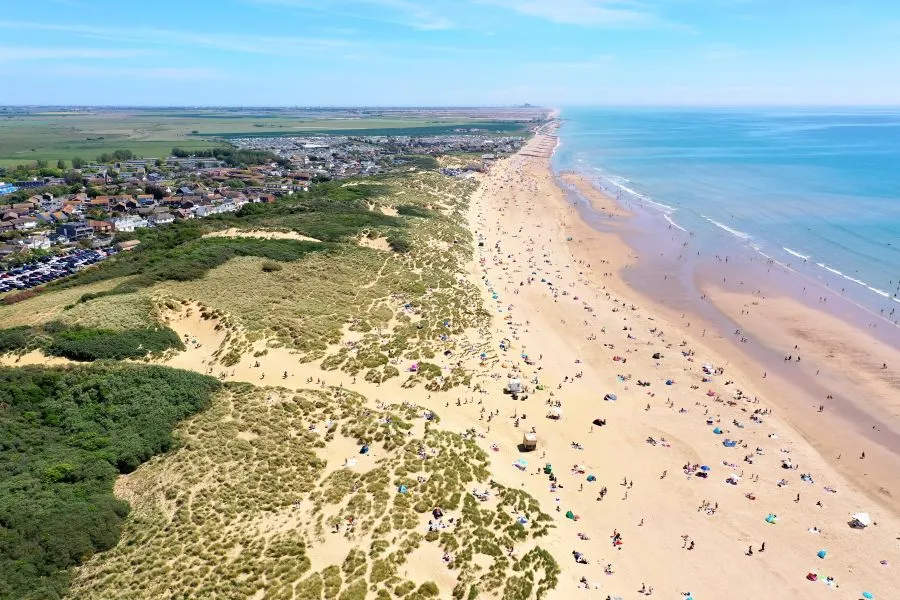UK faces calls for binding plastic pellet rules after major Camber Sands spill
Key takeaways
- Up to 10 metric tons of plastic pellets have leaked from Southern Water’s Eastbourne facility onto Camber Sands beach.
- The EIA urges the UK to adopt binding legislation to prevent, contain, and report pellet losses across all sectors.
- Critics say the UK is “falling behind” on pellet regulation, with no national safeguards, transparency rules, or accountability framework.

The Environmental Investigation Agency (EIA) has urged the UK to adopt a binding plastic pellet regulation after a “major pollution” incident occurred along the coast of East Sussex.
On October 29, up to 10 metric tons of plastic beads leaked from Southern Water’s Eastbourne Treatment Works into the sea via a 3.4 km pipe. Since then, many of the pellets have washed up on Camber Sands, a neighboring beach.
Plastic pellets are used to purify water by creating layers of biofilm, which is composed of bacteria that clean the water. Billions are held in water tanks and are separated from the environment by a mesh screen. Southern Water has explained that the leak “resulted from the failure of a metal screening filter that is designed to retain all beads in the tank.”

The EIA, a UK and US-based non-profit organization, has criticized the incident, highlighting the negative effect plastic pellets can have on the environment and marine life. It has called for the UK to instate legislation that regulates the use of plastic pellets in water treatment. The UK currently has no binding legislation that regulates the use.
Amy Youngman, legal and policy specialist at the EIA, says: “Plastic pellets are essentially an oil spill in solid form, but with added chemical toxicity. There are also prevention measures that can completely mitigate these losses, yet they remain almost entirely unregulated in the UK.”
Since the spillage, Southern Water has apologized and is working on cleaning up the beach.
“We apologize sincerely for this rare and extremely serious occurrence, and we understand completely the anger and anxiety it has caused to communities along the south east coast. We are determined to do all we can to put things right, and we recognize this is a long-term, substantial commitment,” says the private utility company.
“Critical blind spot”
The EIA has called for the UK government to regulate the use of plastic pellets, emphasizing a “critical regulatory blind spot” that does not regulate land spillages.
 Camber Sands, a popular beauty spot in East Sussex, is littered with plastic pellets after the spill.Additionally, plastic pellets attract algae and smell similar to food, making them a desirable food source for birds, fish, and dolphins.
Camber Sands, a popular beauty spot in East Sussex, is littered with plastic pellets after the spill.Additionally, plastic pellets attract algae and smell similar to food, making them a desirable food source for birds, fish, and dolphins.
“While much of the policy focus to date has been on losses of pellets from ships or during transport, the Camber Sands spill shows plastic pellet pollution can also stem from land-based infrastructure such as wastewater treatment plants.”
The organization emphasizes the need for effective prevention and clear regulatory safeguards to prevent technical failures from causing the release of plastic into the environment.
The EIA is calling for the UK government to adopt legislation that prevents, contains, and reports plastic pellets losses across the supply chain. Moreover, the EIA demands that transparency systems must require operators to publish data on pellet losses that is accessible to the public.
Additionally, the Environment Agency must conduct an independent inquiry into Southern Water and Defra must “clearly recognize” that plastic pellets are not just a shipping issue, but also a source of land-based pollution.
Local impact
According to the EIA, plastic pellets pose a large threat to marine life as they have been found to contain polycyclic aromatic hydrocarbons. These chemicals are linked to cancer, and absorb and leach toxic chemicals such as lead, antimony, and bromine.
Chris Dixon, ocean campaign lead and the EIA, says: “Camber Sands is home to an incredible array of wildlife, from nesting seabirds to seals and delicate dune ecosystems. The news of millions of toxic plastic beads polluting this environment is devastating.”
“At a time when water companies are jacking up prices while continuing to pump sewage — and now plastics — into the environment, this is another blow to Britain’s coastlines. Southern Water should take urgent action to ensure this never happens again and act urgently to remediate harm that has already been caused by this toxic plastic spill.”
Transparency demands
The UK is “falling dramatically behind” in plastic pellet legislation. The EIA outlines that the country has no national binding regulations to prevent pellet losses, such as those at Camber Sands, no transparency reporting system, and no public accountability framework.
Previously, the EIA advocated for the regulation of plastic pellets in the EU, which the EU Council and the European Parliament provisionally agreed upon in April.
However, some NGOs are skeptical of the EU’s plastic pellet regulation, highlighting that most pellet handlers are exempt from the most stringent requirements, which creates significant enforcement and compliance gaps.












